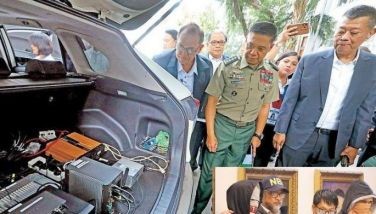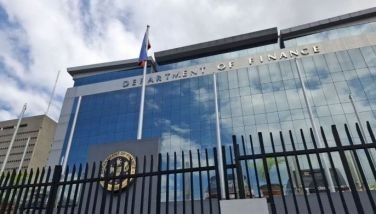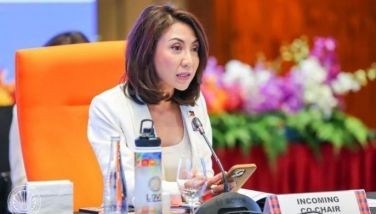SWS hits Comelec ban on poll surveys
January 30, 2007 | 12:00am
The Commission on Elections (Comelec) has defied the Supreme Court by issuing a resolution prohibiting the publication of election surveys before the ballots are cast in May, a polling firm said yesterday.
The Social Weather Stations (SWS) demanded an apology from the Comelec and asked it to correct the resolution it issued last November on the rules and regulations related to the May national elections.
In a statement, SWS chairman Mahar Mangahas pointed out that Comelec spokesman Jaime Jimenez already admitted in a television interview that the poll body "made a mistake, but claimed that it was not intentional and would be corrected soon."
Under Section 32 of Resolution 7767, the Comelec said "surveys affecting national candidates shall not be published fifteen days before the day of the election and surveys affecting local candidates shall not be published seven days before the day of the election."
Mangahas noted this was the very same provision of the Fair Elections Act declared unconstitutional by the Supreme Court in its ruling on May 5, 2001 on the case involving SWS and the Comelec.
"In an act of sheer incompetence, if not of outright malice, the Commission on Elections has issued a resolution forbidding publication of election surveys in direct defiance of a Supreme Court decision declaring election surveys protected by the constitutional guarantee of freedom of expression," Mangahas said.
"Having been the petitioner and thus, winning the legal battle for election survey freedom, Social Weather Stations deserves an apology from Comelec for making such a grievous error," he insisted.
Mangahas recalled learning about the "offending" Comelec provision only last Jan. 22 when he was invited by television talk show host Pia Hontiveros of ANC to participate in discussions about "election survey freedom."
Jimenez, who was also a guest on the show, admitted the Comelec erred in the provision and said it would be corrected "soon," Mangahas said.
Responding to Jimenez’s statement via phone-patch, the SWS chief said: "I would believe the correction only when I see it," insisting that it be done "immediately and not in the indefinite future."
Mangahas said he was able to obtain a copy of the Comelec resolution on Jan. 26 "through personal contacts."
"As of yesterday, I have not seen any correction from Comelec even though Mr. Jimenez claimed to me by telephone on Jan. 25 that the correction was ‘awaiting Comelec signature’."
For as long as no corrections are made, he said the resolution is a "continuing violation of freedom of expression as guaranteed by the Constitution" since it has been two months since it was issued.
Mangahas warned that SWS would take whatever legal action is necessary to force the Comelec to abide by the Supreme Court ruling.
"The Comelec’s antagonism to election surveys is of long standing," he lamented.
Mangahas pointed out that on May 4, 1998, ABS-CBN discovered "secret minutes" of a Comelec en banc meeting on April 21, 1998, showing supposed plans of the poll body to issue a last-minute ban on exit polling for the May 11 elections.
He said a temporary restraining order was fortunately secured on May 9, 1998 from the Supreme Court thus permitting the ABS-CBN/SWS exit poll to proceed without legal harassment.
Mangahas said the Supreme Court finally decided on the case of ABS-CBN v. Comelec on Jan. 28, 2000 in favor of the petitioner, making the restraining order permanent.
"Thanks to this Supreme Court decision, an early proposal to include even exit polling among acts banned in elections, was removed by the senators who drafted the bill which led to the Fair Elections Act of 2001," Mangahas said.
The Social Weather Stations (SWS) demanded an apology from the Comelec and asked it to correct the resolution it issued last November on the rules and regulations related to the May national elections.
In a statement, SWS chairman Mahar Mangahas pointed out that Comelec spokesman Jaime Jimenez already admitted in a television interview that the poll body "made a mistake, but claimed that it was not intentional and would be corrected soon."
Under Section 32 of Resolution 7767, the Comelec said "surveys affecting national candidates shall not be published fifteen days before the day of the election and surveys affecting local candidates shall not be published seven days before the day of the election."
Mangahas noted this was the very same provision of the Fair Elections Act declared unconstitutional by the Supreme Court in its ruling on May 5, 2001 on the case involving SWS and the Comelec.
"In an act of sheer incompetence, if not of outright malice, the Commission on Elections has issued a resolution forbidding publication of election surveys in direct defiance of a Supreme Court decision declaring election surveys protected by the constitutional guarantee of freedom of expression," Mangahas said.
"Having been the petitioner and thus, winning the legal battle for election survey freedom, Social Weather Stations deserves an apology from Comelec for making such a grievous error," he insisted.
Mangahas recalled learning about the "offending" Comelec provision only last Jan. 22 when he was invited by television talk show host Pia Hontiveros of ANC to participate in discussions about "election survey freedom."
Jimenez, who was also a guest on the show, admitted the Comelec erred in the provision and said it would be corrected "soon," Mangahas said.
Responding to Jimenez’s statement via phone-patch, the SWS chief said: "I would believe the correction only when I see it," insisting that it be done "immediately and not in the indefinite future."
Mangahas said he was able to obtain a copy of the Comelec resolution on Jan. 26 "through personal contacts."
"As of yesterday, I have not seen any correction from Comelec even though Mr. Jimenez claimed to me by telephone on Jan. 25 that the correction was ‘awaiting Comelec signature’."
For as long as no corrections are made, he said the resolution is a "continuing violation of freedom of expression as guaranteed by the Constitution" since it has been two months since it was issued.
Mangahas warned that SWS would take whatever legal action is necessary to force the Comelec to abide by the Supreme Court ruling.
"The Comelec’s antagonism to election surveys is of long standing," he lamented.
Mangahas pointed out that on May 4, 1998, ABS-CBN discovered "secret minutes" of a Comelec en banc meeting on April 21, 1998, showing supposed plans of the poll body to issue a last-minute ban on exit polling for the May 11 elections.
He said a temporary restraining order was fortunately secured on May 9, 1998 from the Supreme Court thus permitting the ABS-CBN/SWS exit poll to proceed without legal harassment.
Mangahas said the Supreme Court finally decided on the case of ABS-CBN v. Comelec on Jan. 28, 2000 in favor of the petitioner, making the restraining order permanent.
"Thanks to this Supreme Court decision, an early proposal to include even exit polling among acts banned in elections, was removed by the senators who drafted the bill which led to the Fair Elections Act of 2001," Mangahas said.
BrandSpace Articles
<
>
- Latest
- Trending
Trending
Latest
Trending
Latest
Recommended
































